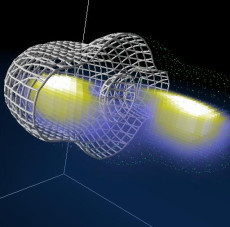John Shalf's Paper is Among the Best in History of HPDC Conference
February 27, 2012
Jon Bashor, Jbashor@lbl.gov, +1 510-486-5849

The team used Cactus to perform simulations of the spiraling coalescence of two black holes, a problem of particular importance for interpreting the gravitational wave signatures being measured by detectors such as the Laser Interferometer Gravitational-Wave Observatory.
“The Cactus Code: A Problem Solving Environment for the Grid,” a paper co-authored by John Shalf of the Computational Research Division, has been selected as one of the top papers in the 20 years of publications from HPDC, the International ACM Symposium on High-Performance Parallel and Distributed Computing. Other authors of the paper, written in 2000, are Gabrielle Allen, Werner Benger, Tom Goodale, Hans-Christian Hege, Gerd Lanfermann, André Merzky, Thomas Radke and Edward Seidel.
The team used Cactus to perform simulations of the spiraling coalescence of two black holes, a problem of particular importance for interpreting the gravitational wave signatures being measured by detectors such as the Laser Interferometer Gravitational-Wave Observatory. Detection of the first gravitational waves (or failure to do so) will strongly test Einstein’s Theory of General Relativity, the results of which will have ramifications that extend throughout the world of physics. Using Cactus, the team created the first-ever accurate simulation of a spiraling merger of this type.
To mark the first 20 years of the symposium, members of the HPDC community were invited to nominate what they felt were the top papers. A committee then looked more carefully at the nominated papers and nominator recommendations to select the top group of 20 papers. A special proceedings issue containing these papers will be produced and distributed at HPDC'12, the 21st to be held June 20-22 in Delft, the Netherlands. Omni-Press will produce the proceedings.
HPDC is sponsored by SIGARCH, the Special Interest Group on Computer Architecture of the Association for Computing Machinery.
About Computing Sciences at Berkeley Lab
High performance computing plays a critical role in scientific discovery. Researchers increasingly rely on advances in computer science, mathematics, computational science, data science, and large-scale computing and networking to increase our understanding of ourselves, our planet, and our universe. Berkeley Lab’s Computing Sciences Area researches, develops, and deploys new foundations, tools, and technologies to meet these needs and to advance research across a broad range of scientific disciplines.







 Instagram
Instagram YouTube
YouTube